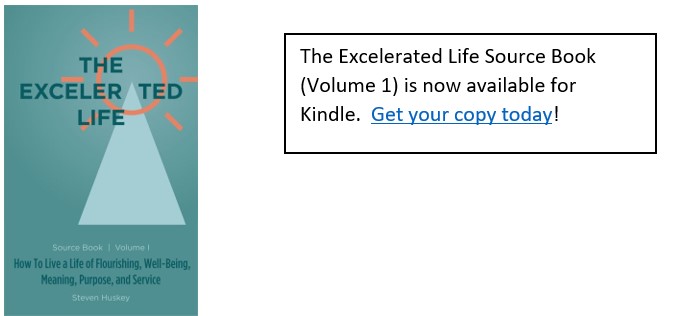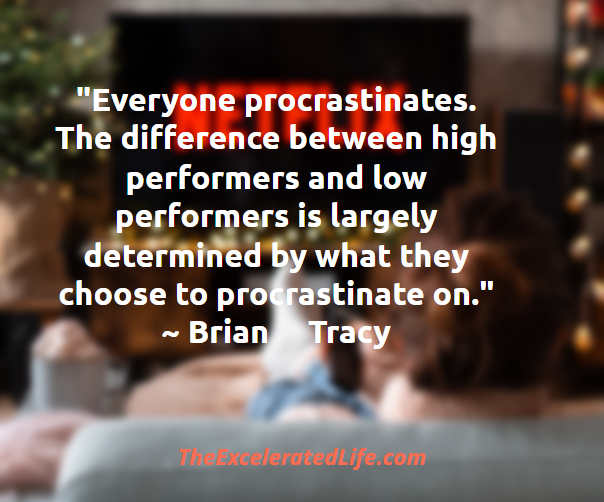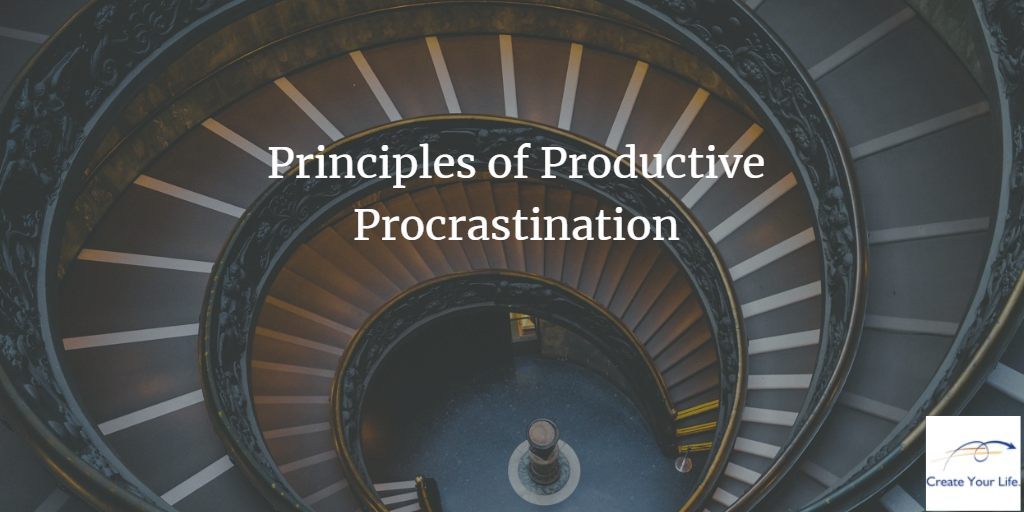Everybody procrastinates, said Brian Tracy. But what separates high performers from low performers is what they procrastinate on. Productive procrastinators procrastinate on unimportant and less important tasks in order to concentrate on their most important tasks.
Title Photo by Cosmin Paduraru
A Productivity Killer
“You must match time’s swiftness with your speed in using it, and you must drink quickly as though from a rapid stream that will not always flow.” ~ Seneca
I was reading a summary of Seneca’s On The Shortness Of Life when a particular passage caught my attention. This is what it said: “They keep themselves officiously preoccupied in order to improve their lives; they spend their lives in organizing their lives. They direct their purposes with an eye to a distant future. But putting things off is the biggest waste of life: it snatches away each day as it comes, and denies us the present by promising the future. The greatest obstacle to living is expectancy, which hangs upon tomorrow and loses today. You are arranging what lies in Fortune’s control, and abandoning what lies in yours. What are you looking at? To what goal are you straining? The whole future lies in uncertainty: live immediately.”
I have often said that I put the “PRO” in procrastination, but fortunately, over time, I’ve learned to slay that dragon, that productivity killer. Well, most of the time. Still, I need to have reinforcement in the form of wisdom such as this.
How about you? Is procrastination killing your productivity? If that’s the case, even if it’s only some of the time, I’d like to introduce you to the principle of “Productive Procrastination”.

Busy ≠ Productive
Now, we’re not talking simply about being busy all the time. In most cases, being busy ≠ to being productive. Once long ago, when my daughters were much younger, they played a trick on me. I rushed out to go to work one morning and cranked up my car. As soon as I did, the fan started blowing at full blast, the radio blared at full volume, the wipers slapped back and forth, the turn signal blinked off and on! I was startled at first (and I admit, a little angry) but then I laughed at those two little stinkers!
I got everything stopped and headed out to work. As I drove down the street, it occurred to me that I had had a very busy car, but it was going nowhere. It was not focused, if I may say so, on its top priority, which was getting me to work. Oh, it was very busy but not at all productive.
And truthfully, I could describe myself that way, too, from time to time. What about you?
Structured Procrastination
If we agree that procrastination can be a problem, at least some of the time, let’s consider some different ways we procrastinate.
An idea I recently came across is something called “structured procrastination”. It is sometimes called “productive procrastination” but I have a different take on that phrase, which we’ll get to in a minute. Structured procrastination involves putting off your most important task by doing other work that is important, just not your top priority. [Shatz]
Procrastination seldom involves doing nothing. Usually, we find whole lists of things to do rather than buckle down and do the one thing that is most important. We clean off our desks. Or we read e-mails. We check the latest news or latest sports scores. We do the dishes.
Other times, though, we may actually be doing necessary work. It just isn’t the most important work. It may be working on this month’s budget when you need to be completing a proposal that is due tomorrow. Or maybe you have ten loads of dirty laundry, nothing clean to wear, and you’re sweeping the floor. Perhaps you’re shopping online for next year’s Christmas gifts while your spouse’s birthday is next week and yet you have no plans.
Get the idea? You’re doing important things, just not the one thing you need to do. But productive procrastination – my version of it – can help.
Procrastination Via Distractions
“Procrastination is opportunity’s natural assassin.” ~ Victor Kiam
As we discussed earlier, when we procrastinate, we aren’t usually idle. We’re busy, just doing less important things. This is procrastination through distraction as we distract ourselves from our most important task.
One thing that keeps us from getting to that important task is all the other things we can do. As we noted earlier, you can be extremely busy but not very productive. I occasionally find myself going through the mail, straightening bookshelves, or planning a new project simply to distract myself from an unpleasant or just a really big job. I may not realize it at first, but eventually, I wake up to the fact that I’m procrastinating. You may have had similar experiences.
The internet has raised distraction to an art form with e-mail to check, news sites to keep up with, Facebook, YouTube, Twitter, Instagram, and on and on. Shawn Achor, writing in The Happiness Advantage, has observed that we work all the time and yet we almost never work. [Achor]
We distract ourselves from the important tasks by continually doing unimportant tasks that often shouldn’t be done at all. And here is where Productive Procrastination can help.

Principles of Productive Procrastination
I got this idea of productive procrastination from Brian Tracey. “Everyone procrastinates,” Brian writes in Eat That Frog. “The difference between high performers and low performers is largely determined by what they choose to procrastinate on.” [Tracy] Productive procrastinators procrastinate on the unimportant and less important tasks in order to concentrate on their most important tasks.
This is similar to the structured procrastination we discussed earlier with one important distinction. When you are engaged in structured procrastination, you’re doing valuable tasks, they just aren’t your important ones. Using productive procrastination, you put off unimportant tasks as well as work that is important to focus on your top priority tasks. Everyone procrastinates. Let us choose to put off everything except our highest priorities.
Do you need help determining your highest priority work? For many years, I used Brian Tracey’s ABC method of prioritizing tasks. Using this model, you write down everything you have to do today. Then you go through the list and mark your highest priority tasks as As. You should have no more than 2 or 3 of these. Next, mark the next-highest priority tasks as Bs. The rule is that you never work on a B task if there is an open A-level task. Finally, mark the lower-priority tasks as Cs. Again, you never work on a C task if there is a B-level task undone.
Of course, you won’t always be able to fully complete some tasks, but you concentrate on them until you go as far as you can.
If you really want to get detailed, you can add a couple more designations. Add D for delegated tasks. You aren’t working on these yourself but you need to keep up with the progress that is being made by the folks you delegated them to. And you could use E for time wasters: reading the comics, watching the latest episode of your favorite TV show, and so on. But my advice is to avoid adding these to your list in the first place.
Just Get Started
“Right here is a good place to start.”
How do you quit procrastinating? Or maybe a better question is how do you implement productive procrastination since we’re not likely to quit?
A technique I’ve been using is to always be asking “What’s important now?” When you start the day or when you complete a task, ask the question: What’s important now?
When you ask “What’s important now?”, keep in mind this technique from David Allen’s Getting Things Done. Allen terms this “The Four-Criteria Model for Choosing Actions in the Moment”. [Allen] Using this model you choose what’s important now based on the following criteria.
- Context: Where are you? What tools are available to use?
- Time: How much time is available?
- Energy: How much energy do you have?
- Priority: Based on the context, time, and energy available, what task will give you the highest return?
You won’t necessarily always pick your most important thing using David Allen’s Four-Criteria technique. Sometimes it will make sense to read the comics or watch TV or use structured procrastination to do a productive chore that isn’t your most important thing. But when you ask “What’s important now?”, keeping in mind your context, available time, and energy level, you’ll be much more likely to get your MITs done.
Rest ≠ Procrastination
“We have . . . a deeply bizarre idea of what it means to spend your time ‘well’ – and, conversely, what counts as wasting it. In this view of time, anything that doesn’t create some form of value for the future is, by definition, mere idleness. Rest is permissible, but only for the purposes of recuperation for work, or perhaps for some other form of self-improvement. It becomes difficult to enjoy a moment of rest for itself alone, without regard for any potential future benefits, because rest that has no instrumental value feels wasteful.” [Burkeman]
As we look to diminish our tendency for procrastination, here is an important fact to keep in mind. Rest ≠ procrastination. Our culture and our economic system sometimes make it seem as if we are shirking our duties when we take time off. It is turning us more and more into “the kind of people who don’t actually want to rest” and we find it difficult, even unpleasant, to slow down and take time to rest and recover. [Burkeman]
But keep in mind that we all are subject to circadian rhythms of activity and rest. Build a reserve of energy to tackle your most difficult tasks by making rest a priority.
Take Imperfect Action
“Take imperfect action and be patient.” ~ Dr. Lyn Kelley
Are you putting something off? Is there a task or chore you need to tackle? A major improvement you need to implement? The next step toward your BIG goal that you need to take? I’m pretty sure creating a Masterpiece day does not start tomorrow! It starts today. In fact, it starts NOW.
Your growth lies just outside of your comfort zone. You won’t make progress or live on purpose by waiting till tomorrow to get started. If you find you’re putting off your important priorities, implement productive procrastination. “The difference between high performers and low performers is largely determined by what they choose to procrastinate on.” So choose wisely. That is embracing your Excelerated Life™!
How does procrastination keep you from achieving your best results?
How could you use productive procrastination to put off the unimportant things?
Share your thoughts by leaving a comment below.
Excelerated Productivity™ — improving efficiency and effectiveness — is one step in creating your Excelerated Life™, a life of flourishing and well-being, and a life of meaning, purpose, and service.
Read more about the Excelerated Life™.
Resources:
Achor, Shawn. The Happiness Advantage. New York: Crown Publishing Group, 2010.
Allen, David. Getting Things Done (Revised Edition). New York: Penguin Books, 2015.
Burkeman, Oliver. Four Thousand Weeks: Time Management For Mortals. New York: Farrar, Straus and Giroux, 2021.
Shatz, PhD, Itamar. “Productive Procrastination: How to Procrastinate in a Structured Way.” Solving Procrastination. Solving Procrastination,. Web. December 24, 2022.
Tracy, Brian. Eat That Frog! San Francisco, CA: Berrett-Koehler Publishers, Inc., 2007.


